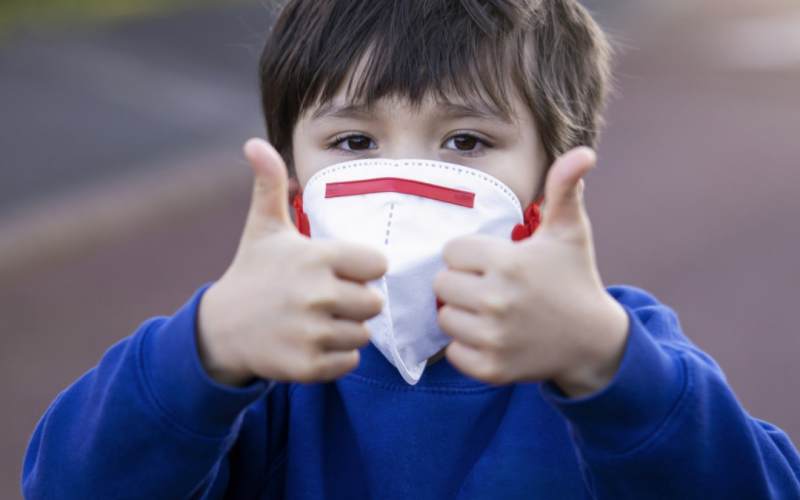COVID-19 infection has been reported in children of all ages however case numbers seem to be far lower than in adults. Current evidence suggests that they generally experience a milder form of the illness than adults, with most infected children presenting with mild symptoms or none at all.
While most children with COVID-19 experience mild symptoms or have no symptoms at all, some can become severely ill. Ziqitza says like adults, children can also spread the virus to others even if they are asymptomatic. Babies under 1 year old, and children with certain underlying conditions, may be more likely to experience severe illness if they contract COVID-19. Experts are also investigating the risk of a rare condition called Multisystem Inflammatory Syndrome in Children (MIS-C) which is associated with COVID-19 in children.
Ziqitza Rajasthan suggests how you can protect your children?
Here’s how these tips can protect children and decrease their child’s risk by managing the amount of time they spend with others.
- Get your child vaccinated if they are twelve years of age or older
- Monitor your child for symptoms of COVID-19, such as high fever, sore throat, cough, stomachache, or headache
- Keep track of your child’s close contacts with others
- Take steps to protect your child if you become sick
- Keep your child home and seek care if your child becomes sick
- In a medical emergency, call 108 Ambulance or call toll-free 104 Health Helpline which are government initiatives operated by Ziqitza Healthcare Ltd in multiple states.
It has been over a year and the entire world continues to battle the pandemic. According to experts, the third wave will be equally disastrous for children just like the second wave. You will be shocked to know that the children are still vulnerable during the third wave. Do you have children at home? Wondering how to care for them? Here, ZHL Rajasthan has put down a few points where more and more children are contracting Covid infection and this may continue during the third wave as well.
- It is imperative for children to understand carefully what their parents are saying. They should use a mask, hand sanitizer, and talk with other children or family members by maintaining a social distance of 6 feet. Avoid being around sick people and try to cover the mouth while coughing and sneezing. Do not believe in any information circulating on social media. View information only from the trusted and reliable sources. Do not fall prey to rumors.
- Explain what the virus is and how it’s transmitted using kid-friendly language. Elementary school children can grasp that germs like the coronavirus are invisible, tiny microorganisms that can spread from one person to another. Kids can also understand that even people who don’t seem sick with COVID-19 because they are asymptomatic can infect others. We recommend that parents keep up with news on the virus and explain things to their children in an honest way, using simple words
- As parents, you must see to it that all the elderly members of the family should get inoculated for Covid-19. If you are jabbed then you are unlikely to cause the infection to the children in the house.
- If any of the family members exhibit symptoms of Covid-19 like cough, fever, or body pain then isolate yourself from the children, or else they will contract the virus.
- Don’t forget to disinfect the frequently touched surfaces by children like doorknobs, handles, faucets, and even the furniture.
- Let them sleep well, Ziqtza Limited explains sleep helps keep the body healthy, giving it time to fight off infections and repair any damage. It’s important to remember that children need more sleep than adults to stay healthy.
- Children ages 3 to 5 need 10 to 13 hours of sleep per day (including naps).
- Children ages 6 to 12 need 9 to 12 hours of sleep.
- Teenagers need 8 to 10 hours of sleep.
Help your child get the sleep they need by enforcing an age-appropriate bedtime. You should also provide them with an environment designed for sleep. It should be cool, dark, quiet and free of screens. For younger children, a bedtime routine can help them settle into sleep more easily.
- Make your children eat a well-balanced diet consisting of all the essential nutrients. Dr.Datar Ziqitza HealthCare suggests parents try to boost their immunity by including fresh fruits and vegetables in their diet. Avoid spicy, junk, oily, sugary, processed, and salty foods that can take a toll on your child’s immunity.
- Do not delay or skip your child’s vaccination. Do not venture out with your children in crowded places. Limit the number of visitors at home. Try to keep your children occupied with various activities like painting, dancing, or gardening at home to help them beat boredom. You can also exercise at home with your children to help them stay healthy and hearty.


